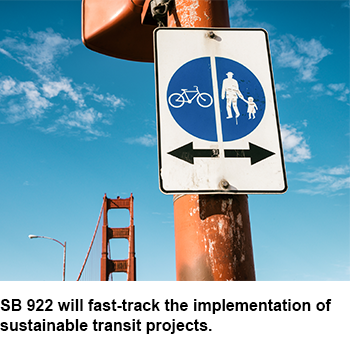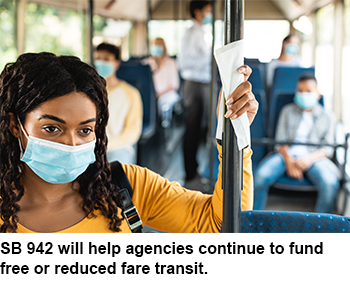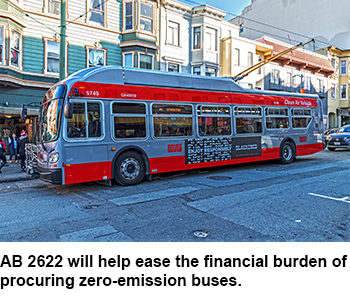Gov. Newsom Signs Association Co-Sponsored SB 922 (Wiener), SB 942 (Newman), and AB2622 (Mullin) Into Law
By Jacob Herson
Managing Editor
Transit California
Late last month, Governor Newsom signed three bills co-sponsored by the California Transit Association into law: SB 922 (Wiener); SB 942 (Newman); and AB 2622 (Mullin). SB 922 extends CEQA exemptions for certain clean transportation projects, expands on certain project categories, and makes numerous definitional changes to the law. SB 942 allows public transit agencies to use funds from the Low Carbon Transit Operations Program (LCTOP) to continuously subsidize free or reduced fare transit programs. AB 2622 extends, for two years, the partial sales and use tax exemption for zero-emission buses (ZEBs) purchased by California transit agencies.
“The Association sponsored these bills because they tackle some of the biggest challenges facing our industry at present: clearing hurdles for more clean transportation projects to be built, finding responsible funding sources for free and reduced fare transit programs, and easing the sharp financial burden operators face in trying to meet zero-emission state mandates,” said Michael Pimentel, Executive Director for the Association. “Together, they constitute a major victory for our industry. We are thankful to Senators Weiner and Newman, Assemblymember Mullin, the State Legislature, and Governor Newsom for continuing to recognize the vital role transit must play in the future of our state.”
SB 922 (Wiener): Extending CEQA Exemptions
State Senator Wiener (D-San Francisco) introduced SB 922 to extend and expand upon his previous bill, SB 288, which became law in 2020. The law expanded statutory exemptions from the California Environmental Quality Act (CEQA) for specified transportation projects. CEQA was passed in 1970, following the National Environmental Protection Act (NEPA), with more stringent requirements for the state. CEQA requires state and local agencies to evaluate and disclose the significant environmental impacts of projects they approve and to avoid or mitigate those impacts if possible. CEQA importantly originated to protect the environment from projects such as refineries that pollute natural resources and jeopardize health, especially for historically marginalized and underserved populations.
“CEQA is not climate law,” explains Senator Wiener. “It’s a very outdated 1960s/70s environmental law from back when the environmental movement was dominated by the belief that people are pollution and population growth is our main environmental problem. We now know that’s not the problem. The problem is carbon emissions.” Transportation accounts for 40 percent of California’s GHG emissions.
Wiener continued: “We see CEQA unfortunately being misused to undermine environmentally sustainable projects, whether it’s putting more student housing on campus, or creating a bike lane, or a bus only lane, a light rail, or pedestrian infrastructure.”
California agencies launched 15 projects under SB 288. The legislation sunsets on January 1, 2023, however; hence the need for SB 922. The bill was co-sponsored by the California Transit Association, SPUR, the Bay Area Council, the Silicon Valley Leadership Group (SVLG), and the Los Angeles County Metropolitan Authority.
SB 922 extends the sunset date in SB 288 through 2030. It also expands the projects that qualify for exemptions to include those that do the following:
- Make streets safer for walking and biking;
- Speed up bus service on streets;
- Improve bus service on highways;
- Expand carpooling options;
- Build new, or modernize light rail stations;
- Support parking policies that reduce single-occupancy vehicle trips and congestion;
- Improve wayfinding for people using transit, biking, or walking.
The bill prevents exemptions from being misapplied by requiring that projects also:
- Must be located in an existing public right of way;
- Must not add new auto capacity;
- Must not demolish affordable housing;
- Must use a skilled and trained workforce or have a project labor agreement in place.
Furthermore, for projects estimated to cost over $100 million, the lead agency or project sponsor must also:
- Expand public participation requirements so engagement occurs early in a project and when input can be most meaningful;
- Complete a project business case to evaluate benefits and costs and enable communities to shape the project early in the planning and alternatives development process;
- Complete a racial equity analysis and suggest mitigations to address any disproportionate impacts.
Senator Wiener told Transit California, “We also need a lot more of these projects as a priority to make it easier for people to get around by public transit and make it easier and safer for people to bike and walk in their communities. SB 922 will continue to allow us to make those improvements. In addition, we are finally seeing increased investment in transit from the federal infrastructure package but also from state, local, and regional investments, and we need to get that money on the ground quickly. It’s very frustrating if you have the money but you have to spend years doing environmental review for a project that we know will reduce carbon emissions.”
SB 942 (Newman): Funding Free or Reduced Fare Transit
State Senator Josh Newman (D-Fullerton) introduced SB 942 to build on his earlier legislation, SB 1119, which revised the eligibility requirements for transit fare subsidies to allow more low-income residents, particularly students, to be able to take advantage of the Low Carbon Transit Operations Program (LCTOP). “Although the programs that SB 1119 enabled have clearly been successful and well received in their respective communities, including my home district in Orange County, the existing funding and reporting requirements for agencies administering LCTOP programs remained unwieldy enough to pose challenges to the long-term viability of these programs,” said Newman. “SB 942 updates the requirements for re-application and reporting to allow transit agencies to administer programs that utilize continuous LCTOP funding while still requiring the validation of their success in supporting GHG reductions.”
The LCTOP receives five percent of funds deposited into the Greenhouse Gas Reduction Fund, which receives all funds (except for fines and penalties) collected by the California Air Resources Board. Existing law requires each transit agency that receives LCTOP funds to demonstrate that each expenditure reduces GHG emissions and does not supplant another source of funds, to use those funds to provide transit operating or capital assistance, to use at least 50 percent of the funds to benefit disadvantaged communities, and to submit specified information to the department before seeking a disbursement of those program funds.
Under previous law, an agency had to repeatedly demonstrate that it meets those requirements to continue using LCTOP funds to maintain a program. SB 942 removes that hurdle, allowing agencies that use LCTOP funds for a fare free or reduced fare transit program to continue doing so once they demonstrate compliance in their initial program application.
SB 942 was one of three separate proposals involving free or reduced fare transit recently considered by the Legislature. The Legislature did not move forward with Governor Newsom’s proposal for a $750 million to fund free transit for all Californians for three months, or Assemblymember Chris Holden’s AB 1919, which would have established a new Youth Transit Pass Pilot Program to support fare free transit programs, benefitting California students and allocating $115 million to compensate for lost farebox revenue. Removing hurdles to an existing funding source, SB 942, did not require a massive appropriation, did not threaten to fiscally harm agencies, and does not have a set limitation on its timeframe.
“The California Transit Association’s co-sponsorship of SB 942 was clearly a key to the bill's ultimate success through their ability to access and leverage their broad network of transit agencies throughout the state,” said Senator Newman. “This led individual agencies to join us in advocating for the proposed change to LCTOP by effectively conveying to my colleagues the importance of free and reduced-fare programs across the state.” The bill was co-sponsored by the Orange County Transportation Authority.
Senator Newman told Transit California: “When implemented, SB 942 will provide multiple, simultaneous benefits by expanding mass transit usage and creating lifelong riders, reducing congestion on our streets and roads, and removing barriers to mobility, and creating opportunities for so many of the working-class families who have been substantially negatively affected by the pandemic over the past two years.”
Free and reduced fare transit programs target the interaction of social, environmental, and economic challenges. “I serve on a number of Senate committees with purview over the intersection of transportation, environmental, and equity issues facing Californians,” said Newman. “SB 942 is a good example of how well-designed legislation can have a positive impact in all three areas. Providing low-cost options that encourage people to make public transit a lifelong habit will be key to any long-term strategy that effectively builds toward California’s goals of reducing congestion and pollution, as well as the burdens they create on both the California economy and communities in transportation corridors.”
AB 2622 (Mullin): Making ZEBs More Affordable
State Assemblymember and Speaker Pro Tempore Kevin Mullin (D-San Mateo) pursued AB 2622 following his 2019 legislation, AB 784. That existing Sales and Use Tax Law provides various exemptions from those taxes, including for specified zero-emission technology transit buses sold to specified public agencies that are eligible for specified incentives from the State Air Resources Board. AB 2622 extends this exemption from its current sunset date of January 1, 2024 until January 1, 2026.
“The COVID pandemic decimated many transit agencies’ budgets, which didn’t allow them to fully avail themselves of the original bill I authored in 2019, which provided this sales tax exemption to public transit agencies for only four years,” said Assemblymember Mullin. “Additionally, I recognized that transit agencies are often cash strapped, losing money at the fare box and relying on federal, state, and local subsidies to cover capital costs. Transit agencies need clarity on the sales and use taxes that would apply to zero emission bus purchases, beginning in 2024, as they begin their often lengthy procurement processes.”
As Transit California has reported, operators across the state are committed to meeting the 2040 mandate for zero-emission buses (ZEBs), but they face steep financial hurdles, given the current cost differential between diesel or compressed natural gas (CNG) and hydrogen-electric vehicles.
“Working with the California Transit Association on this measure was extremely helpful,” said Assemblymember Mullin. “Their knowledge and expertise in the area and being able to answer questions about the technology and cost differentials with traditional diesel technology was invaluable.” On behalf of transit agencies, the Association continues to work with the California Air Resources Board, legislators, and manufacturers to overcome the financial hurdles and achieve shared climate goals without negatively impacting service.
“I have always been a climate change champion and a leader on climate change policy in the State Assembly,” said Mullin. “Having represented San Mateo County for 10 years, I have an intimate understanding of how climate change is impacting the region and the urgency required to accelerate the electrification of the transportation sector. Assisting public transit agencies via this adoption perfectly aligns with my priorities.
Mullin continued: “I am confident that AB 2622 will accelerate the adoption of zero-emission busses throughout California, especially in regions that suffer from poor air quality. AB 2622 not only benefits our hardworking transit agencies but all Californians with better air quality.”